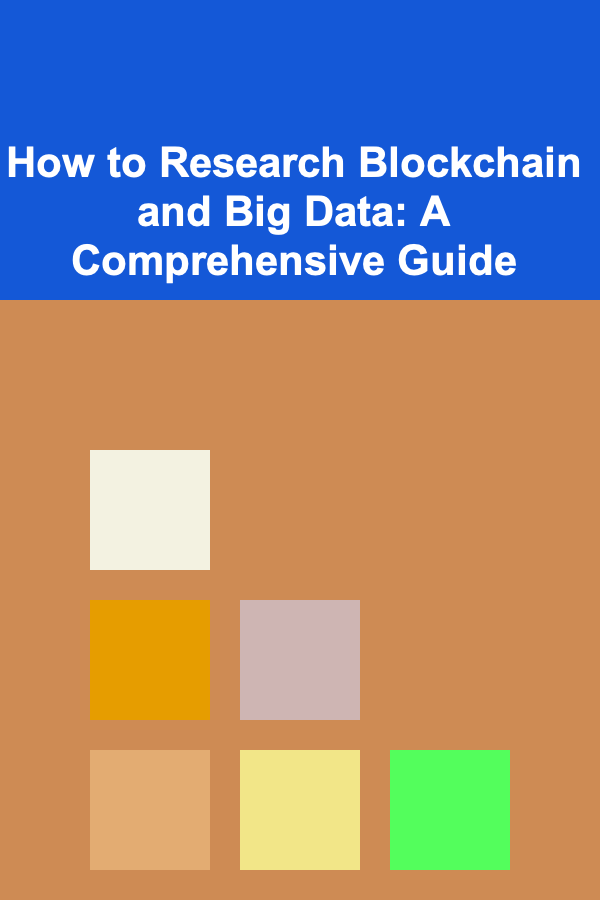
How to Research Blockchain and Big Data: A Comprehensive Guide
ebook include PDF & Audio bundle (Micro Guide)
$12.99$9.99
Limited Time Offer! Order within the next:

In the ever-evolving landscape of technology, two domains have gained immense attention in recent years: Blockchain and Big Data. Both have the potential to redefine industries, enhance decision-making processes, and bring about significant advancements in various fields. Blockchain, initially popularized by cryptocurrencies like Bitcoin, has found applications in diverse areas like finance, supply chain, healthcare, and even governance. Big Data, on the other hand, has revolutionized how organizations analyze and leverage vast amounts of information to drive insights, optimize operations, and create value.
In this article, we will explore how to conduct effective research in these two transformative technologies, understand their key components, and investigate how they intersect to drive innovation. Whether you're a beginner or an expert looking to dive deeper into these fields, this guide will provide you with the necessary tools and strategies for successful research.
Understanding Blockchain and Big Data
Before delving into how to research these technologies, it's essential to have a clear understanding of their core principles.
What is Blockchain?
At its core, blockchain is a distributed ledger technology (DLT) that records transactions across multiple computers in a secure, immutable, and transparent manner. It is designed to be decentralized, meaning no central authority controls the system, making it resistant to tampering, fraud, and manipulation.
Key features of blockchain include:
- Decentralization: Blockchain operates across a network of nodes, with no single point of control.
- Security: Through cryptographic techniques, blockchain ensures that data cannot be altered or tampered with once recorded.
- Transparency: Every transaction is visible to all participants, fostering trust and accountability.
- Immutability: Once data is recorded on the blockchain, it cannot be modified or erased.
Blockchain can be applied in various sectors, from financial services (cryptocurrency) to supply chain management, voting systems, and healthcare data storage.
What is Big Data?
Big Data refers to the vast and complex sets of data generated at an unprecedented scale from various sources, including social media, sensor networks, digital transactions, and more. This data is characterized by the "3 Vs":
- Volume: The sheer amount of data generated is staggering.
- Variety: Data comes in various formats, including structured, semi-structured, and unstructured forms.
- Velocity: The speed at which data is generated and processed is incredibly fast.
Big Data enables organizations to gain valuable insights by analyzing these massive datasets. Key applications include predictive analytics, customer behavior analysis, operational optimization, and more.
The Intersection of Blockchain and Big Data
While Blockchain and Big Data are often treated as separate technologies, there is a growing intersection between the two. Blockchain provides a secure and immutable way to manage and share data, while Big Data techniques can help organizations analyze and derive insights from the data stored on the blockchain.
For example, blockchain can be used to securely store Big Data in decentralized networks, ensuring that the data remains tamper-proof. On the other hand, Big Data analytics can be employed to analyze blockchain transactions, uncovering patterns, trends, and insights that were previously hidden.
The combination of Blockchain and Big Data has the potential to create new business models, enhance privacy and security, and enable organizations to make better, data-driven decisions.
How to Research Blockchain and Big Data
Now that we've covered the basics of Blockchain and Big Data, let's explore the steps and strategies to research these technologies effectively.
1. Start with a Strong Foundation
Before diving into advanced topics, it's crucial to have a solid understanding of the fundamentals. Start by familiarizing yourself with the core concepts and technologies that underpin Blockchain and Big Data. Some key resources for building this foundation include:
- Books :
- Blockchain Basics by Daniel Drescher
- Big Data: A Revolution That Will Transform How We Live, Work, and Think by Viktor Mayer-Schönberger and Kenneth Cukier
- Online Courses :
- Coursera offers several courses on both Blockchain and Big Data.
- edX provides certifications and courses in data science and blockchain technologies.
- Research Papers: Reading academic research papers from reputable journals and conferences will help you understand the theoretical underpinnings of these technologies.
2. Follow Industry News and Trends
Blockchain and Big Data are rapidly evolving fields, and keeping up-to-date with the latest news and trends is essential for effective research. Regularly following industry blogs, news websites, and social media platforms will help you stay informed about the latest advancements, challenges, and applications.
Some trusted sources for news and updates include:
- Blockchain News Websites :
- CoinDesk
- The Block
- Blockchain News
- Big Data News Websites :
- TechCrunch (Big Data section)
- Dataversity
- Datafloq
In addition to these platforms, social media channels like Twitter, Reddit, and LinkedIn are great places to follow thought leaders, industry experts, and organizations that are actively engaged in blockchain and big data research.
3. Explore Real-World Use Cases and Applications
One of the best ways to gain insights into Blockchain and Big Data is by studying real-world use cases. Look for case studies, whitepapers, and reports from companies and organizations that are applying these technologies in practical settings.
Some areas where Blockchain and Big Data are making a significant impact include:
- Healthcare: Blockchain can be used to store and manage sensitive health data, while Big Data analytics helps to identify health trends and predict disease outbreaks.
- Finance: Blockchain enables secure and transparent financial transactions, while Big Data allows for risk analysis, fraud detection, and algorithmic trading.
- Supply Chain Management: Blockchain enhances transparency and traceability, while Big Data helps optimize supply chain operations and predict demand.
By studying these applications, you can gain a deeper understanding of how Blockchain and Big Data are transforming industries and how they can be leveraged for future innovations.
4. Dive Into Technical Documentation and Whitepapers
For a deeper, more technical understanding of these technologies, refer to official documentation, whitepapers, and academic research. These resources provide in-depth knowledge about how Blockchain networks are designed, how data is processed and analyzed in Big Data systems, and how these technologies can be integrated.
Some examples include:
- Blockchain Whitepapers :
- The original Bitcoin whitepaper by Satoshi Nakamoto
- Ethereum's whitepaper by Vitalik Buterin
- Big Data Research Papers :
- MapReduce: Simplified Data Processing on Large Clusters by Jeffrey Dean and Sanjay Ghemawat (the paper introducing MapReduce)
- The Hadoop Distributed File System by Konstantin Shvachko et al.
Technical documentation and whitepapers are invaluable resources for gaining a deeper understanding of the algorithms, protocols, and infrastructure that power Blockchain and Big Data systems.
5. Experiment with Tools and Technologies
Hands-on experience is essential for gaining a comprehensive understanding of both Blockchain and Big Data. By experimenting with tools, platforms, and frameworks, you can get a feel for how these technologies work in practice.
For Blockchain:
- Blockchain Development Platforms :
- Ethereum (using Solidity for smart contract development)
- Hyperledger Fabric (an open-source framework for enterprise blockchains)
- Binance Smart Chain (for decentralized application development)
For Big Data:
- Big Data Tools and Frameworks :
- Apache Hadoop (a framework for processing large datasets)
- Apache Spark (a fast, in-memory data processing engine)
- MongoDB (a NoSQL database for Big Data storage)
Working with these tools will give you practical experience in developing decentralized applications (dApps) on Blockchain and processing Big Data using distributed computing frameworks.
6. Collaborate with the Community
Collaboration with others in the research community is one of the most effective ways to stay at the forefront of Blockchain and Big Data developments. Participate in forums, attend conferences, and join online groups that focus on these technologies.
Some popular online communities include:
- Blockchain Communities :
- Ethereum StackExchange
- r/Blockchain on Reddit
- Blockchain Developers on GitHub
- Big Data Communities :
- Stack Overflow (Big Data section)
- Data Science Central
- r/DataScience on Reddit
By collaborating with others, you can share ideas, discuss challenges, and get feedback on your research. This collaborative approach will help you stay engaged and motivated in your research journey.
7. Stay Critical and Ethical in Your Research
As you research Blockchain and Big Data, it is essential to maintain a critical and ethical approach. Both technologies raise important questions about privacy, security, and the ethical use of data. Ensure that your research addresses these concerns and considers the broader societal implications.
Some ethical issues to consider include:
- Data Privacy: How should data be protected, especially when dealing with personal or sensitive information?
- Decentralization vs. Control: What are the implications of decentralizing control over data and systems through Blockchain?
- Bias in Big Data: How can we ensure that data analysis algorithms are unbiased and fair?
By being mindful of these ethical issues, you can contribute to the responsible development of Blockchain and Big Data technologies.
Conclusion
Researching Blockchain and Big Data requires a combination of foundational knowledge, practical experience, and an ongoing commitment to staying up-to-date with the latest trends and technologies. By following the strategies outlined in this guide, you will be well-equipped to explore these transformative technologies, understand their impact, and contribute to their continued evolution. Whether you're interested in the technical aspects of Blockchain development or the analytical power of Big Data, the opportunities for research and innovation in these fields are vast and exciting.
Reading More From Our Other Websites
- [Home Rental Property 101] How to Find Homes for Rent with a Garage and Extra Storage Space
- [Home Family Activity 101] How to Teach Kids About Financial Literacy Through Play
- [Needle Felting Tip 101] Sustainable Creativity: Eco-Friendly Practices in Needle Felting Art
- [Survival Kit 101] The Power of Self-Reliance: How to Build Confidence and Independence in Your Daily Life
- [Screen Printing Tip 101] From T‑Shirts to Tote Bags: Beginner‑Friendly Screen‑Printing Ideas
- [Home Cleaning 101] How to Create a Monthly Cleaning Checklist for Busy Professionals
- [Stamp Making Tip 101] Troubleshooting Common Mistakes When Converting Drawings into Perfect Stamps
- [Personal Investment 101] How to Invest in Mutual Funds for Steady Growth
- [Gardening 101] Essential Garden Watering Tips for Thriving Plants
- [Organization Tip 101] How to Organize Craft Supplies in Your Entryway

How to Clean and Maintain Your Washer and Dryer
Read More
How to Set Up an Effective Home Office Space
Read More
How to Stage a Home With Pets Without Compromising the Look
Read More
How to Use Vintage Decorations to Add Charm to Your Holiday Home
Read More
Grasping Mendelian Genetics: A Deep Dive
Read More
How to Meal Plan with Dietary Restrictions (Gluten-Free, Vegan, etc.)
Read MoreOther Products

How to Clean and Maintain Your Washer and Dryer
Read More
How to Set Up an Effective Home Office Space
Read More
How to Stage a Home With Pets Without Compromising the Look
Read More
How to Use Vintage Decorations to Add Charm to Your Holiday Home
Read More
Grasping Mendelian Genetics: A Deep Dive
Read More